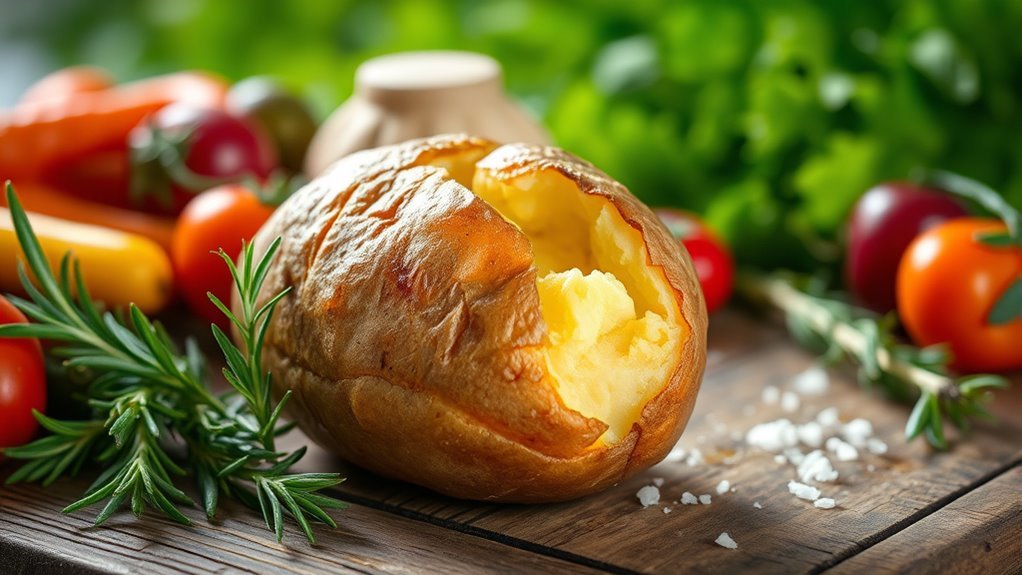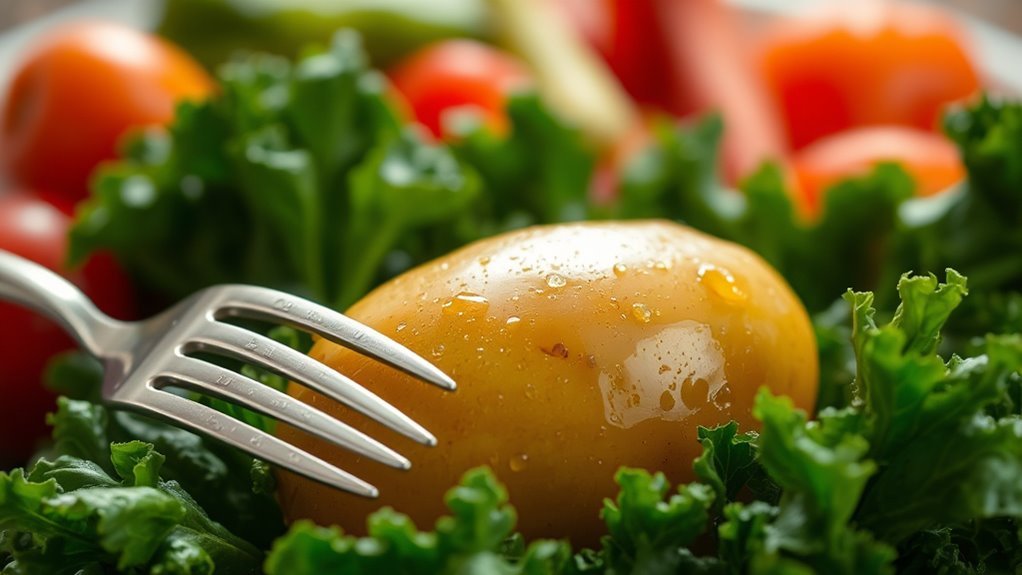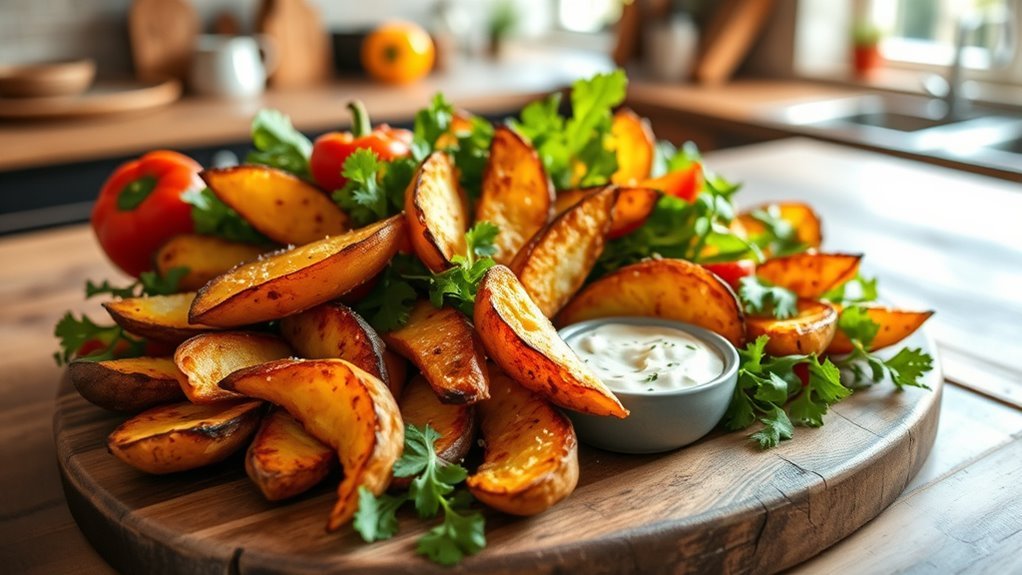You generally can’t eat potatoes on a ketogenic diet due to their high carbohydrate content. A medium russet potato has around 37g of carbs, which can disrupt ketosis and spike your blood sugar. While potatoes are nutritious, their carb levels can hinder your ketogenic goals. If you want to enjoy potatoes in moderation, consider smart preparation methods and portion control. There are also tasty low-carb alternatives you might want to explore for your meals.
Understanding Carbohydrates in Potatoes

When it comes to understanding carbohydrates in potatoes, it’s essential to recognize that their carbohydrate content can greatly impact a ketogenic diet. Different potato types, such as russet, red, and sweet potatoes, vary markedly in their carb levels. For instance, a medium russet potato contains about 37 grams of carbohydrates, while sweet potatoes offer around 26 grams. This high carbohydrate content can make it challenging to incorporate potatoes into a keto lifestyle, where daily carb intake is typically limited to around 20-50 grams. If you’re seeking to maintain your freedom of choice in food, knowing the carbohydrate content of these potato types is vital. It allows you to make informed decisions in balancing your dietary preferences with your ketogenic goals.
The Impact of Potatoes on Ketosis

Although potatoes are a staple in many diets, their high carbohydrate content can greatly disrupt ketosis, the metabolic state sought in a ketogenic diet. When you consume potatoes, the significant carbs lead to increased blood sugar levels, which can kick you out of ketosis. This shift can hinder the ketosis effects you aim for, such as enhanced fat burning and improved energy levels. While potatoes might offer nutritional benefits, those benefits come with a cost for your ketogenic goals. If you’re committed to maintaining ketosis, it’s essential to monitor your carb intake and consider alternatives that align better with your dietary aspirations. Freedom in your diet means making informed choices that support your journey toward ideal health.
Nutritional Breakdown of Common Potato Varieties

Understanding the nutritional composition of various potato types can help you make informed choices, especially if you’re following a ketogenic diet. Different potato varieties have distinct nutritional content that can impact your carb intake. For instance, a medium-sized russet potato contains about 37 grams of carbs, while a red potato has around 30 grams. Yukon gold potatoes fall in between, with approximately 32 grams. If you’re aiming for a keto lifestyle, these numbers can be significant. While potatoes are rich in vitamins and minerals, their high carbohydrate levels can hinder ketosis. It’s crucial to evaluate these factors when deciding if you want to include any potato varieties in your meals, balancing your nutritional goals with your dietary preferences.
Low-Carb Alternatives to Potatoes
If you’re looking to cut carbs while still enjoying hearty dishes, there are several low-carb alternatives to potatoes that can satisfy your cravings without derailing your ketogenic diet. Here are some tasty substitutes you can try:
- Cauliflower mash: Creamy and versatile, it mimics mashed potatoes perfectly.
- Zucchini fries: Baked or fried, these add a crunchy texture to your meals.
- Radish chips: Thinly sliced and roasted, they offer a zesty, low-carb snack option.
- Turnip wedges: Roasted until golden, they provide a satisfying, savory flavor.
Other options like parsnip puree and eggplant slices can also be delicious substitutes. Incorporating these alternatives can keep your meals exciting while adhering to your keto lifestyle.
Tips for Enjoying Potatoes on a Keto Diet
While traditional potatoes are high in carbs, there are ways to incorporate them into your keto diet in moderation. Focus on smart potato preparation methods, like baking or steaming, which can help retain nutrients without adding extra calories. Consider using smaller potatoes, such as fingerlings or new potatoes, to better control portions. Stick to a serving size of about 1/2 cup to keep your carb intake in check. Pair your potatoes with healthy fats, like avocado or olive oil, to enhance satiety and balance your meal. Finally, monitor your overall daily carb allowance, ensuring that potatoes fit comfortably within your limits. With mindful choices, you can enjoy potatoes while respecting your keto lifestyle.
Recipes Featuring Keto-Friendly Potato Substitutes
Many people looking to maintain a keto lifestyle find themselves missing the comforting texture and versatility of potatoes. Thankfully, there are delicious substitutes that can satisfy those cravings without kicking you out of ketosis. Here are some tasty options to try:
- Cauliflower mash: A creamy alternative that mimics the texture of mashed potatoes.
- Radish fries: Roasted or air-fried radishes can provide that crispy texture you love.
- Zucchini boats: Stuffed with your favorite fillings, they make a hearty dish.
- Celeriac puree: A great low-carb substitute for creamy sides.
Experimenting with these alternatives lets you enjoy familiar flavors while sticking to your keto goals. Don’t hesitate to explore other options like turnip wedges, eggplant slices, kohlrabi chips, and spaghetti squash for even more variety!
Final Thoughts on Potatoes and Keto
When it comes to following a keto diet, the question of whether or not you can include potatoes often arises. While traditional potatoes are high in carbs, it’s possible to enjoy them in moderation. Finding the right balance is key to your keto success.
Here’s a quick overview:
| Potato Type | Carbs Per 100g | Keto-Friendly? |
|---|---|---|
| White Potato | 17g | No |
| Sweet Potato | 20g | No |
| Cauliflower (sub) | 5g | Yes |
Incorporating potato moderation into your meals can allow for flexibility, but remember, too many carbs can kick you out of ketosis. By making informed choices, you can still enjoy your favorite flavors while pursuing your keto journey.
Frequently Asked Questions about Eating Potatoes on Keto
1. Can I eat potatoes on a ketogenic diet?
Potatoes are generally not considered keto-friendly due to their high carbohydrate content. A medium-sized potato can contain around 30 grams of carbs, which can exceed the daily carb limit for most people on a ketogenic diet. Instead, low-carb alternatives like cauliflower or zucchini are often recommended for those following keto.
2. What are the carb limits for a ketogenic diet?
The typical carb limit for a standard ketogenic diet ranges from 20 to 50 grams of net carbs per day. This limit is crucial for achieving and maintaining ketosis, where your body burns fat for fuel instead of carbohydrates. Since a single serving of potatoes can use up a significant portion of your daily carb allowance, they are usually avoided on keto.
3. Are there any low-carb potato alternatives for a keto diet?
Yes, there are several low-carb alternatives to potatoes that are more suitable for a ketogenic diet. Some popular options include cauliflower, which can be mashed or riced, and turnips, which can mimic the texture of potatoes in various dishes. Other alternatives include rutabaga and kohlrabi, both of which are lower in carbs and can be used in similar recipes.
4. Can I eat small amounts of potatoes on keto?
While it is technically possible to consume small amounts of potatoes while still maintaining ketosis, it can be risky. Even small portions can quickly add up in carbs and might hinder your ability to stay within your daily carb limit. If you choose to include potatoes, make sure to monitor your overall carb intake closely and consider balancing it with lower-carb foods.
5. What impact do potatoes have on ketosis?
Potatoes can significantly impact your state of ketosis due to their high carbohydrate content. Consuming potatoes can lead to elevated blood sugar levels, which may cause your body to switch from burning fat to relying on carbohydrates for energy. This shift can disrupt the metabolic state of ketosis, making it more challenging to achieve and maintain the desired benefits of a ketogenic diet.
References
- https://www.healthline.com/nutrition/ketogenic-diet-101
- https://www.ncbi.nlm.nih.gov/pmc/articles/PMC6520870/
- https://www.mayoclinic.org/healthy-lifestyle/nutrition-and-healthy-eating/expert-answers/keto-diet/faq-20439300
- https://www.hsph.harvard.edu/nutritionsource/healthy-weight/diet-reviews/keto-diet/
- https://www.webmd.com/diet/what-is-the-ketogenic-diet
- https://www.verywellfit.com/what-is-the-ketogenic-diet-5112606
- https://www.sciencedaily.com/releases/2020/04/200413130751.htm
- https://www.cdc.gov/healthyweight/assessing/bmi/adult_bmi/english_bmi_calculator/bmi_calculator.html
- https://www.eatright.org/health/wellness/preventing-illness/the-ketogenic-diet
- https://www.nutrition.gov/topics/nutrition-education/keto-diet


